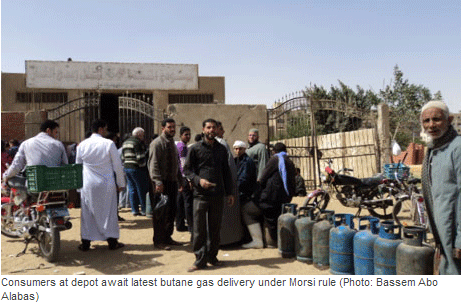

.gif)
Post Morsi: Egypt’s energy woes far from over
Marwa Hussein, Sunday 21 Jul 2013
Dropping consumption due to unrest and a crackdown on fuel smuggling have eased, temporarily, energy demand, but Egypt's chronic energy and fuel shortage problems persist
Endless lines at petrol stations and frequent long blackouts that preceded mass protests 30 June disappeared in a blink of an eye afterthe ouster of president Mohamed Morsi.
Many take this as proof that Morsi and the Muslim Brotherhood were behind the crisis, while others — particularly Morsi supporters —believe fuel shortages were the result of a conspiracy by feloul, or remnants of the Mubarak regime, targetting Morsi’s popularity.
Both camps might be partially right. On the one hand, the efficiency of Morsi’s government and its responses to the people’s needs was questionable in many domains. The electricity crisis revealed a lack of coordination in the fallen government, with the minister of electricity and the minister of petroleum exchanging blame for natural gas and diesel fuel shortages.
On the other hand, the timing of the crisis, its intensity and its sudden disappearance is rather enigmatic.
No matter which of the two theories is correct, it only intensified the crisis but it did not create it. Indeed, the breakthrough that occurred does not mean the problem is solved.
Structural deficiencies
Egypt’s energy problems have existed since 2008. The only new element is the intensity and the length of the crisis.
In 2007 and 2008, Egypt witnessed long queues in front of gas stations due to diesel shortages that emerged all of a sudden. While in August 2008, Egyptians experienced frequent long blackouts for the first time in decades.
“The problem has not been solved; demand has simply eased,” says Mohab Hallouda, senior energy specialist for the MENA region at the World Bank.
After 30 June, and due to the protests and violence that followed, economic activity slowed down as many companies closed or scaled down.
“Many factories closed and some are still operating under capacity; many shops also closed, and the tourism sector has since then been almost paralysed," explains Hallouda. "The demand for electricity as well as for fuel has decreased considerably due to these factors.”
The drop in temperatures since the start of the month to around 33 ºC on average has also helped reduce consumption.
"Production capacity of power plants can drop up to 15 percent due to the heat,” says Hallouda. “Each degree exceeding 35 affects the efficiency of the power plants,” adds Aktham Aboul-Ela, spokesman for the Egyptian Ministry of Electricity.
Aboul-Ela also notes that supplies of natural gas from the Ministry of Petroleum have become more regular. The last government had officially declared that the shortage of dollars and liquidity in general affected fuel supplies needed for electrical power plants.
According to Aboul-Ela, all the abovementioned factors have reduced consumption by 2,500 Megawatts (less than 10 percent of the total production capacity of Egypt).
After 30 June, demand also considerably eased for fuel and diesel as many people stayed at home while others joined marches. "In Shell, we received the main amounts of fuel and diesel before and after 30 June; it is demand that has eased," the director of a Shell gas station in Giza told Ahram Online.
Smuggling and insecurity
The main reason the government gave for the fuel shortage was smuggling. Last week, footage from the Egyptian armed forces revealing underground tanks used to smuggle diesel to Gaza was spread. Other stories about smuggling fuel hit the media.
"The crisis has eased as security forces are exerting more effort to limit smuggling, while at the same time consumption decreased," says petroleum ministry spokesman Hamdi Abdel Aziz.
Hallouda expects the energy crisis to return if temperatures go up any time. In the medium and long terms he believes the situation is not sustainable. “If the economy starts to grow, the production capacity of energy in the country will not be enough. The crisis will then reappear,” he said.
Experts have estimated that at least three to four years are required for the country to overcome its electricity problems, if the government addresses the problem head on and invests in new capacity.
As for the fuel issue, the solution is easier, as increasing imports can end the problem. But liquidity seems to be a major issue, with energy subsidies increasing steadily, causing pressure on the currency, the debt profile, and the budget deficit.
The solutions different governments — before and after the revolution — have presented reside mainly in cutting subsidies to save the funds needed to develop the service, in addition to opening infrastructure development to the private sector.
No government has so far dared to seriously cut energy subsidies.Meanwhile, a parliamentary bill allowing the private sector to enter in different stages of energy production is pending since 2007.
A political question
“Technical solutions will not be enough, political solutions are also needed,” says Akram Youssef, an expert in power engineering and political activist.
“To make the people accept the consequences of the reform plan of energy production and subsidy cuts you need to make them real partners.”
For Youssef, a radical solution for Egypt’s energy problem will only emerge with real democracy, including at a local level.
“The people will not accept subsidies to be cut if they are not convinced that the savings will be used to benefit the poor,” adds Hallouda, emphasising that a whole new strategy — which implies considerable changes — is necessary.
http://english.ahram.org.eg/News/77018.aspx





